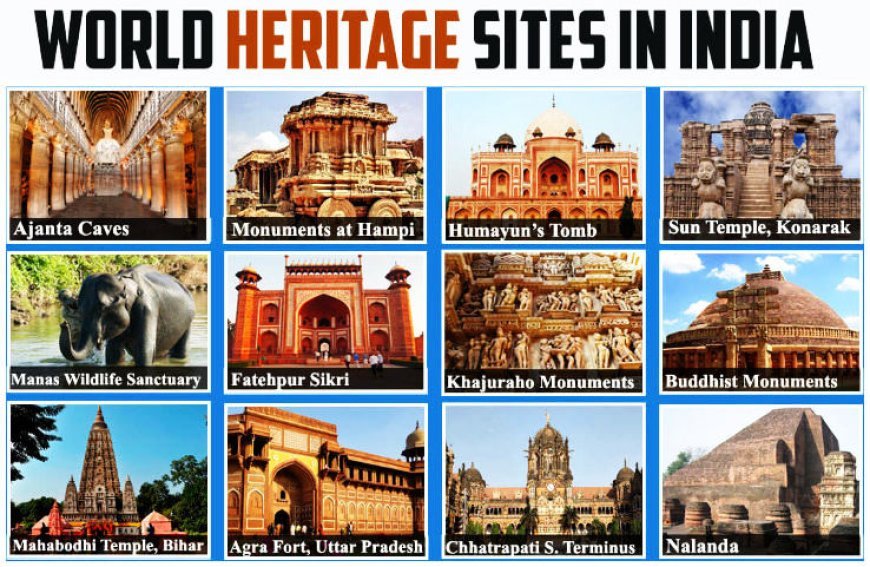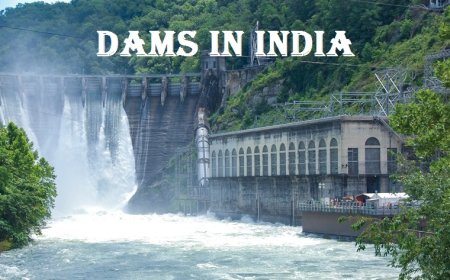UNESCO World Heritage Sites in INDIA

UNESCO World Heritage Sites in INDIA
The United Nations Educational, Scientific and Cultural Organization (UNESCO) seeks to encourage the identification, preservation and protection of cultural and natural heritage around the world . A World Heritage Site is a place that is listed by UNESCO for its special cultural or physical significance, which have been nominated by countries which are signatories to the UNESCO World Heritage Convention, established in 1972.
Cultural heritage consists of monuments (such as architectural works, monumental sculptures, or inscriptions), groups of buildings, and sites (including archaeological sites).
Natural heritage (consisting of physical and biological formations), geological and physiographical formations (including habitats of threatened species of animals and plants), and natural sites which are important from the point of view of science, conservation or natural beauty, are defined as natural heritage.
India has 40 UNESCO World Heritage Sites, of which 32 are Cultural Heritage Sites, 7 are Natural Heritage sites and one mixed site.
Cultural Heritage Sites in India
These 32 cultural heritage sites in India represent the country's rich history, cultural diversity, and architectural achievements. They are testimony to the artistic and cultural legacy of India and are significant tourist attractions.
Here is the list of all 32 Cultural Heritage Sites in India:
- Agra Fort, Agra, Uttar Pradesh-1983
- Ajanta Caves, Aurangabad, Maharashtra-1983
- Ellora Caves, Aurangabad, Maharashtra-1983
- Taj Mahal, Agra, Uttar Pradesh- 1983
- Sun Temple, Konark, Odisha- 1984
- Group of Monuments at Hampi, Karnataka- 1986
- Khajuraho Group of Monuments, Khajuraho, Madhya Pradesh- 1986
- Mahabodhi Temple Complex at Bodh Gaya, Bihar- 2002
- Churches and Convents of Goa- 1986
- Fatehpur Sikri, Uttar Pradesh- 1986
- Great Living Chola Temples, Tamil Nadu- 1987, 2004
- Group of Monuments at Mahabalipuram, Tamil Nadu- 1984
- Group of Monuments at Pattadakal, Karnataka- 1987
- Hill Forts of Rajasthan, Rajasthan- 2013
- Elephanta Caves, Mumbai, Maharashtra- 1987
- Chhatrapati Shivaji Terminus (formerly Victoria Terminus), Mumbai, Maharashtra- 2004
- Red Fort Complex, Delhi- 2007
- Humayun's Tomb, Delhi- 1993
- Qutb Minar and its Monuments, Delhi- 1993
- Mountain Railways of India- 1999,2005,2008
- Rani-ki-Vav (the Queen’s Stepwell) at Patan, Gujarat- 2014
- Jantar Mantar, Rajasthan- 2010
- Historic City of Ahmedabad, Gujarat- 2017
- Fatehpur Sikri, Uttar Pradesh- 1986
- Jaipur City, Rajasthan- 2019
- Champaner-Pavagadh Archaeological Park, Gujarat- 2004
- Nalanda Mahavihara (Nalanda University), Bihar- 2016
- Rock Shelters of Bhimbetka, Madhya Pradesh- 2003
- The Architectural Work of Le Corbuster, an outstanding Contribution to Modern Movement.
- Victorian Gothic and Art Deco Ensembles of Mumbai, Maharashtra- 2018
- Padmanabhapuram Palace, Kerala- 2014
- Kakatiya Rudreshwara (Ramappa) Temple, Telangana- 2021
Natural heritage sites in India
Natural heritage sites in India offer a glimpse into the country's natural beauty and biodiversity. They are protected areas that are significant for their ecological, geological, and natural features. India is home to a diverse range of natural landscapes, each with its unique flora, fauna, and geological features. Here are seven of the natural heritage sites in India:
- Great Himalayan National Park Conservation Area, Himachal Pradesh-2014
- Kaziranga National Park, Assam- 1985
- Keoladeo National Park, Rajasthan- 1985
- Sundarbans National Park, West Bengal- 1987
- Nanda Devi and Valley of Flowers National Parks, Uttarakhand- 1988,2005
- Western Ghats, multiple states-2012
- Manas Wildlife Sanctuary, Assam.-1985
Visiting these sites is a great way to experience the country's natural wonders and learn about its environmental conservation efforts.
One Mixed Heritage Site in India
There is one mixed heritage site in India that have been recognized by UNESCO for its cultural and natural significance. One of the most prominent mixed heritage sites in India is:
Khangchendzonga National Park, Sikkim: Located in the northern part of the Indian state of Sikkim, Khangchendzonga National Park is a mixed heritage site that was declared a UNESCO World Heritage Site in 2016. The park is known for its spectacular natural beauty, with snow-capped peaks, glaciers, alpine meadows, and a diverse range of flora and fauna. It is also home to several traditional settlements of the Lepcha community, who have lived in the region for centuries and have a unique cultural heritage. The park is named after Khangchendzonga, the third-highest peak in the world, and is significant for its ecological, cultural, and scenic values.
What's Your Reaction?


























































